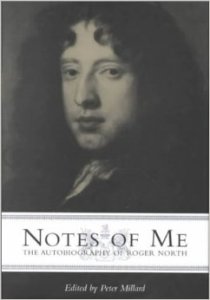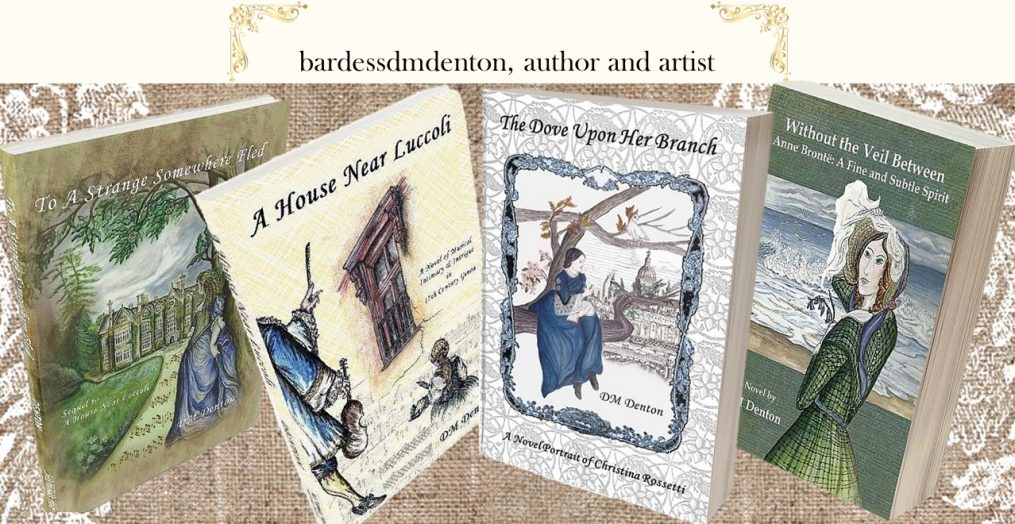My new novel To A Strange Somewhere Fled includes, at its end, a look at its historical aspects. Here is an excerpt:
“(The) history of private men’s lives (is) more profitable than state history.”
~ Roger North, from his General Preface & Life of Dr. John North
Roger North (Sept. 3, 1651 – March 1, 1734) and Francis North (October 22, 1637 – September 5, 1685):
I didn’t have to imagine a male protagonist for the sequel to A House Near Luccoli to contrast the temperament and lifestyle of the charismatic and roguish composer Alessandro Stradella. English biographer and lawyer Roger North well-suited that role, especially as Donatella landed on his doorstep.
Rather timid, even unsociable, Honorable was Roger’s title and the core of his character. He lived slowly, carefully, with a firm sense of belonging to his family, country, and the reaches of his intellect and interests—“practical diversions” that included writing, philosophy, architecture, mathematics, horticulture, sailing, and music.
Roger was born at Tostock, Suffock, the sixth son of the 4th Baron Dudley North and Anne Montagu. Despite a fifteen year age difference he was very attached to his eldest brother, Francis (great-grandfather to Lord North, Prime Minister of Great Britain during most of the American Revolution), and benefited from Francis’ professional and personal connections that took them both to the heights of Charles II’s court. In 1682 Sir Francis was appointed Lord Keeper of the Great Seal and Roger began his service as King’s Counsel. Although staunch royalists, neither was comfortable with the cutthroat political environment of Restoration England.
Thanks to Sir Francis’ marriage to Frances Pope who died in 1678, Wroxton Abbey became his and Roger’s retreat from London. The Popes had been leaseholders of the Abbey since the middle of the 16th century, transforming it into the Jacobean manor house still evident in its present structure. Sir Francis bought out his sister-in-laws’ inheritance and his descendants continued their tenancy of the Abbey well into the twentieth century.
“As to musick”, Roger and Francis carried on the North tradition of pursuing its appreciation, study and performance for familial and social pleasure, and solitary distraction. Their grandfather had traveled in Italy and took a great liking to the music he found there. Roger received instruction from the English composer John Jenkins, and possibly other masters including the spirited Italian violinist Nicola Matteis. It is likely that Roger played the viol, theorbo, harpsichord, organ, and even the violin. He observed and participated in the musical scene of London, his thoughts on theory and performance leading him to eventually publish The Musicall Grammarian (1728). The Seventeenth Century volume of Blackwell’s History of Music in Britain references Roger at least twenty-eight times.
Roger penned biographies of his brothers, a wandering autobiography titled Notes of Me, and even a Discourse on Fish and Fish Ponds, continually and painstakingly recording his reflections and findings on countless subjects. He was one of the executors of the estate of the famous portraitist Peter Lely, and guardian to the painter’s son, John, and daughter, Anne. His architectural talents came into play with improvements made to the north wing of the Abbey and the addition of a coach house and stabling, and he also managed extensive tree planting on the estate.
 Beyond the scope of To A Strange Somewhere Fled, the untimely passing of Sir Francis in 1685 was an oppressive blow to Roger personally, but also professionally for he had lost a true companion and ally at Court. After Sir Francis’ death he spent a little more time at Wroxton Abbey with his brother Dudley and, while winding up their brother’s affairs, they found some distraction in setting up a laboratory and forge there. Charles II died the same year as Sir Francis, and the next Roger was appointed Attorney-General to Queen Mary of Modena, but by 1687 he had turned his back on Royal and Parliamentary conflicts and uncertainties and devoted himself to writing and the improvement and self-sufficiency of the estate he had purchased at Rougham in Norfolk.
Beyond the scope of To A Strange Somewhere Fled, the untimely passing of Sir Francis in 1685 was an oppressive blow to Roger personally, but also professionally for he had lost a true companion and ally at Court. After Sir Francis’ death he spent a little more time at Wroxton Abbey with his brother Dudley and, while winding up their brother’s affairs, they found some distraction in setting up a laboratory and forge there. Charles II died the same year as Sir Francis, and the next Roger was appointed Attorney-General to Queen Mary of Modena, but by 1687 he had turned his back on Royal and Parliamentary conflicts and uncertainties and devoted himself to writing and the improvement and self-sufficiency of the estate he had purchased at Rougham in Norfolk.
Roger was a quieter, plainer, more cautious, modest and moralistic figure than Alessandro Stradella, but no less singular, creative or complex, which made him as interesting to write about. He exhibited a similar if less reckless compulsion to engage himself in the possibilities of the gifts he had been given and to scoff – less openly and, as it turned out, less perilously than Stradella – at a society that expected him to behave as if he was compliant with it.
![]() ©Artwork and writing, unless otherwise indicated, are the property of Diane M Denton. Please request permission to reproduce or post elsewhere with a link back tobardessdmdenton. Thank you.
©Artwork and writing, unless otherwise indicated, are the property of Diane M Denton. Please request permission to reproduce or post elsewhere with a link back tobardessdmdenton. Thank you.





Pingback: Three Lutes and a Violin – bardessdmdenton – author- artist
Thanks for whetting my appetite even more! I haven’t been doing much reading lately but I finally got around to putting “To A Strange Somewhere Fled” on my Kindle. Hope to start reading it soon!
LikeLike
Hi, Barbara! Glad you enjoyed the post. Thank you for your visit and purchasing To A Strange Somewhere Fled. I hope you enjoy it. I value your feedback and look forward to your impressions. Blessings to you and yours, and blowing a kiss to your beautiful sweet granddaughter. XO
LikeLike
This was really fascinating. I’m a bit of a history junkie so these stories which flesh out the emotions and dilemmas of real people always engage my interest. You write about it all so well, and from such a human perspective.
LikeLike
Thank you so much, Peter! Thank you for reading and glad you liked it. History is made by real people … and that is how I approach writing about it. There is such a wealth of untold (ignored for their seeming insignificance ???) stories for the imagination to feast on … the smallest detail or most obscure quote or activity can really spark the writing way forward.
LikeLike
Hi Diane, so many interesting facts here. Your book is something to look forward to 🙂 Hugs ❤ xxx
LikeLike
Thanks, Ina! There was so much information (especially from Roger North’s writings) to try to weave into the novel. An article I saw recently described the process perfectly: ” I often felt as though I’d only written a sentence or two before the next question arose … rich historical fiction takes time to marinate” I’m pretty pleased with how I did, but who knows what others will think. Certainly hope you enjoy it. Lots of love and hugs! XO ❤
LikeLike
Diane, do you think Roger would give Donatella a more settled future than Alessandro, had he survived? It seems so to me , though maybe not as passionate? 😊 xxx❤️
LikeLike
I think I will leave it to you to decide, Christine. As Deborah B wrote: “History is never cut and dried, and the author is careful to leave us with Donatella in a moment of time …” 🙂 XO ❤
LikeLike
😊 I think she has settled for second best but it may be happier in the long term; that often is the way I think. And I think that’s how I will leave her 😊😊❤️ xxx
LikeLike
I’m thinking of your poem Ad Infinitum:
“She must surrender, let the earth revolve,
Each moment lived, another fear dissolved …”
Great love is not usually of this world – it is behind us and ahead of us, but most significantly within us. It is a love affair with ourselves (not in a narcissistic way, but in service to our truth, our purpose, our heart, and the eternal evolution of our soul), which another can lead/guide us to but otherwise cannot provide beginnings or endings, and certainly not definitive answers. XO ❤
LikeLike
Thanks for responding Diane with such a lovely comment. Love and hugs ❤️ Xxx
LikeLiked by 1 person